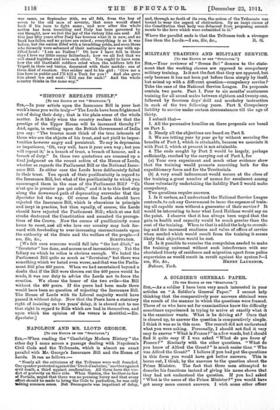NAPOLEON AND MR. LLOYD GEORGE.
[To THY EDITOR OF THE " SPECTATOR."f SIR,—When reading the "Cambridge Modern History" the other day I came across a passage dealing with Napoleon's Civil Code and the Tribunate, which is almost an exact parallel with Mr. George's Insurance Bill and the House of Lords. It ran as follows :— " Nearly all the criticisms of the Tribunes were well founded. One speaker protested against the Droit d'aubaine," another against civil death, a third against confiscation. All three have the ver- dict of posterity on their side. When Simeon, the brother-in-law of Portalis, urged that there was no pressing hurry and that every effort should be made to bring the Code to perfection, he was only calking common sense. But Buonaparte was impatient of delay,
and, through no fault of its own, the action of the Tribunate was bound to wear the aspect of obstruction. By an inept clause of the Constitution that body was debarred from proposing amend- ments to the laws which were submitted to it."
Where the parallel ends is that the Tribunes took a stronger
line than the Lords.—I am, Sir, &c., R. G.


































 Previous page
Previous page